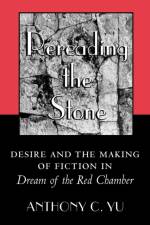von Anthony C. Yu
64,00 €
The eighteenth-century Hongloumeng, known in English as Dream of the Red Chamber or The Story of the Stone, is generally considered to be the greatest of Chinese novels--one that masterfully blends realism and romance, psychological motivation and fate, daily life and mythical occurrences, as it narrates the decline of a powerful Chinese family. In this path-breaking study, Anthony Yu goes beyond the customary view of Hongloumeng as a vivid reflection of late imperial Chinese culture by examining the novel as a story about fictive representation. Through a maze of literary devices, the novel challenges the authority of history as well as referential biases in reading. At the heart of Hongloumeng, Yu argues, is the narration of desire. Desire appears in this tale as the defining trait and problem of human beings and at the same time shapes the novel's literary invention and effect. According to Yu, this focalizing treatment of desire may well be Hongloumeng's most distinctive accomplishment. Through close readings of selected episodes, Yu analyzes principal motifs of the narrative, such as dream, mirror, literature, religious enlightenment, and rhetorical reflexivity in relation to fictive representation. He contextualizes his discussions with a comprehensive genealogy of qing--desire, disposition, sentiment, feeling--a concept of fundamental importance in historical Chinese culture, and shows how the text ingeniously exploits its multiple meanings. Spanning a wide range of comparative literary sources, Yu creates a new conceptual framework in which to reevaluate this masterpiece.

